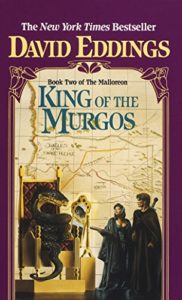Reread of Prince of Nothing Trilogy
Book 3: The Thousandfold Thought
by R. Scott Bakker
The Final March
Chapter 8
Xerash
Welcome to Chapter Eight of my reread. Click here if you missed the Chapter Seven!
To merely recall the Apocalypse is to have survived it. This is what makes The Sagas, for all their cramped beauty, so monstrous.
Despite their protestations, the poets who authored them do not tremble, even less do they grieve. They celebrate.
—DRUSAS ACHAMIAN, THE COMPENDIUM OF THE FIRST HOLY WAR
My Thoughts
I really thought I had read this quote earlier in the series, but it must have just stayed with me. It’s a true statement about Achamian’s psychology. We have seen this over and over throughout the books. It’s the criticism of the soldier who fought in war and saw the truth versus the romantic who doesn’t comprehend just what happened. So, what does that have to do with his chapter?
“Apocalypse could feel so light” is something Esmenet thinks when she first picks up the Saga. This is exactly what Achamian is saying with his quote. Reading about the past makes you remote from it. It’s how humans can repeat the horrors that have come before because the farther removed we get from events, the less impact they have. The more likely they’ll be repeated. Communism killed more people in the 20th century than the Nazis did between Stalin, Mao, Pol Pot, and others. Yet you’ll find educated people today talking about the merits of the system because they’ve only read about it, not lived through its horrors.
Then we go to the next paragraph where Esmenet has her own Saga tattooed on her hand. She’s lived being a whore, but for everyone else who sees it, they can’t understand the poverty, smell, degradation, and simplicity of her past life. Especially not surrounded by her new reality. People will write poems about her. They will celebrate her past, showing how she was redeemed by their prophet. They will not tremble or grieve.
Early Spring 4112 Year-of-the-Tusk, Xerash
The scattered Holy War, split up on Kellhus’s orders, converge on Gerotha with the Ainoni Lord Soter being the first to arrive. He marches straight to the city’s gate, soon nicknamed the Twin Fists, to parley. The citizens are scared of atrocities. Lord Soter laughs, withdraws, and begins the siege. Kellhus, Proyas, and Gotian arrived the next day. Kellhus convinced an embassy from the city, demoralized by being abandoned by their ruler who already fled, to surrender the city without condition.
The following morning found the men of the Gerothan embassy strung from the battlements of the great gate, their entrails sagging to the foundations. According to the defectors who managed to escape the city, there had been a coup that night, led by priests and officers loyal to their old Kianene overlords.
The Men of the Tusk began preparing their assault.
Kellhus rides forward to demand answers. A veteran called Captain Hebarata curses him and rants about the Solitary God’s vengeance. Kellhus levels an ultimatum saying, “From this day I count!” The cryptic statement troubles every one.
Meanwhile, Athjeäri continues his patrols. The young earl takes prisoners and learns that the Kianene are seeking to defile Inrithi holy sites to provoke the Holy War. Talking to his captains, Athjeäri decides “if any man should be provoked to rashness, it should be Coithus Athjeäri.” It begins the start of Athjeäri’s Pilgrimage. However, they are too late to stop the shrine of Muselah from being destroyed.
Upon that ground they swore a mighty oath.
Back at Gerotha, the rest of the Holy War has arrived. They see the city as weak since they have made no sorties to test for weakness. Hulwarga and Gothyelk wan to attack immediately. But Kellhus wants them to wait. “Where hope burns bright, patience is quickly consumed.” He says the city will surrender on its own.
On the fourth day of the siege, Esmenet begins reading The Sagas. Before she does, she hears music playing in the background. She’s dealing with morning sickness. Her her body slaves, she learns that it’s a group of three male slaves showing off their skills. Fanashila wants to marry a handsome one, asking for Esmenet’s permission. That makes her feel sad as she gives it. She visits Moënghus and sees his eyes are blue like Cnaiür and feels guilty for not missing Serwë even while thinking of her own baby. Afterward, she has various meetings, including with Werjau to hear his “Summary of Reports.” It felt “deceptively routine” to her. She learns that Uranyanak, a man who Esmenet wants arrested for sedition but whom Kellhus says is too important, continues to curse him.
Her duties as Intricati busied her long into the afternoon. She had grown accustomed to them enough to become bored, especially when it came to administrative matters. Sometimes her old eyes would overcome her and she would find herself gauging the men about her with the carnal boredom of a whore sizing up custom. A sudden awareness of clothing and distance would descend upon her, and she would feel inviolate in a way that made her skin tingle. All the acts they could not commit, all the places they could not touch… These banned possibilities would seem to hang above her like the hazing the canvas ceilings.
I am forbidden, she would think.
Why this should make her feel so pure, she could not fathom.
After a meeting with Proyas, which always feel awkward because he still grieved “their earlier animosity” and another meeting with Werjau, she found herself free to do what she wants: reading The Sagas. She’s learned to enjoy reading, even hungering for it. She gathers them with the same “miserly feelings she harbored towards her cosmetic chests.” But books don’t hide her fear of aging, they allowed her to “so see more.”
“You’ve learned the lesson,” Kellhus had said on one of those rare mornings when he shared her breakfast.
“What lesson might that be?”
“That the lessons never end.” He laughed, gingerly sipped his steaming tea. “That ignorance is infinite.”
She asks how he could know, and makes a joke about his divinity, causing her to throw a pillow which instantly fills her with wonder for “throwing a pillow at a prophet.” She opens her chest containing her library, books she packed up from Caraskand. She sifts through them and feels apprehensive when she finds The Sagas. Feeling foolish, she scoops it up, marveling that “Apocalypse could feel so light.” As she starts reading, she notices her whore tattoo.
It seemed a kind of charm or totem now—her version of an ancestor scroll. That woman, that Sumna harlot who had hung her legs bare from her window, was a stranger to her now. Blood joined them, perhaps, but little else. Her poverty, her smell, her degradation, her simplicity—everything seemed to argue against her.
She reflects on how all her current power would make “the old Esmenet weep for wonder.” She’s second in power behind Kellhus. Men like Eleäzaras and Proyas have to bow to her. “She had rewritten jnan!” Kellhus promised her this and more. She also is a woman of faith now, not the “cynical harlot.” The old her couldn’t have faith, not with how many priests had bought her services.
The old Esmenet would never accept an understanding indistinguishable from trust.
She even carries a “destiny within her womb.” The greatest change, though, is the knowledge she gained. Through Kellhus, she had her world rewritten and understood the “twin darknesses of custom and appetite.” It had outraged her until she found her faith.
The world indeed held miracles, though only for those who dared abandon old hopes.
With a deep breath, Esmenet dives into the scroll, reading one of those “works familiar even to illiterate caste-menials.” To her, the Ancient North, the No-God, the Apocalypse, and the Ordeal were just curious stories, not anything real. Achamian rarely talked about The Sagas, and when he did, he bad-mouthed them. To him they were “like pearls strung across a corpse.” Achamian always spoke of those events with a “thoughtless, first-hand immediacy” that chilled her. Compared to that, The Sagas became something foolish to her and she like-wise would bad-mouth them to others while feeling smug because of her inside information. Despite this, she knows almost nothing about what The Sagas contained and is shocked to learn it’s a collection of different works from different authors, a mix of epic verse and prose.
She had no idea where Kellhus had obtained the scroll, but it was very old, and as much painted as inked—the prize of some dead scholar’s library. The parchment was uterine, soft and unmottled. Both the style of the script and the diction and tone of the translator’s dedicatory seemed bent to the sensibilities of some other kind of reader. For the first time she found herself appreciating the fact that this history was itself historical. For some reason she had never considered that writings could be part of what they were about. They always seemed to hang… outside the world they depicted.
She feels strange reading it on her marriage bed and finds herself carried away. She realizes reading “made gauze of what was immediate, and allowed what was ancient and faraway to rise into view.”
Infected by a kind of floating wonder, she fell into the first of The Sagas.
She feels it’s a curiously erotic experience reading someone’s else thoughts. She feels an intimate connection with the author. Then she realizes the book is talking about her husband’s ancestor, Anasûrimbor Celmomas. The past suddenly feels so close to her through Kellhus and Achamian’s dreams. She’s shocked to learn that there was history before the First Apocalypse. A lot of history, things she never had heard of. She reads and learns Celmomas II was born with a stillborn brother.
After this, the strange intensity that had nagged everything, from the mere thought of reading The Sagas to the weight of the scrolls in her palm, took on the character of a compulsion. It was as if something—a second voice—whispered beneath what she read. Once she even bolted from the bed and pressed her ear to the embroidered canvas walls. She enjoyed stories as much as anyone. She knew what it was to hang in suspense, to feel the gut of some almost-grasped conclusion. But this was different. Whatever it was she thought she heard, it spoke not to some climactic twist, nor even to some penetrating illumination—it spoke to her. The way a person might.
The next four days would be haggard. Jealousy, murder, rage, and doom before all… The First Apocalypse engulfed her.
Esmenet reads about the rule of Celmomas, the last Kûniüric High King (and the guy who gave the Celmomas Prophecy about the Harbinger’s return), how he was warned by Seswatha, via though Nonmen sorcerers of Ishterebinth, that the Mangaecca School (Consult forerunners) were investigating Min-Uroikas and trying to activate the Inchoroi technology, including the No-God. Seswatha’s Long Argument convinced Celmomas to act, though it was too late.
We’re given an overview how the various sagas see Seswatha, from a wise counselor to a scheming foreigner to a lunatic refugee. We get the first reference, I think, to the great Chorae Hoard at Sakarpus. We learn he was the Bearer of the Heron Spear.
Hated or adored, Seswatha was the pin in the navigator’s bowl, the true hero of The Sagas, though not one cycle or chronicle acknowledged him as such. And each time Esmenet encountered some variant of his name, would clutch her breast and think, Achamian.
As she goes about her day, she’s haunted of the images The Sagas conjured of the brutalities and atrocities committed by the Sranc and other servants. A war that engulfed everything “even the unborn.” She realizes that this is what he dreams night after night. “Each night, he literally relived the No-God’s dread awakening, he actually heard the mothers wail over their stillborn sons.” It makes her think of his mule, Daybreak, and what that name meant to him. A “poignant hope.” She realizes she never knew and feels guilty that she, a whore, didn’t realize he was “debased by hungers vast, ancient, and rutting.”
You are my morning, Esmi… my dawn light.
What could it mean? For a man who lived and relived the ruin of all, what could it mean to awake to her touch, to her face? Where had he found the courage? The trust?
I was his morning.
Esmenet felt it then, overpowering her, and in the strange fashion of moving souls, she struggled to ward it away. But it was too late. For what seemed the first time, she understood: his pointless urgency, his desperation to be believed, his haggard love, his short-winded compassion—shadows of the Apocalypse, all. To witness the dissolution of nations, to be stripped night after night of everything cherished, everything fair. The miracle was that he still loved, that he still recognized mercy, pity… How could she not think him strong?
She understood, and it terrified her, for it was a thing too near to love.
She has a dream of floating over a dark sea, fighting to keep from being dragged beneath it. She is tossed and turned by it and she sees Achamian in the current his arm “waved dead in the current.” Kellhus wakes her up and she clings to him, crying out that she doesn’t want to share him. He doesn’t want to share her.
His words remind her of her kiss with Achamian. Though she never told Kellhus, he knew but didn’t talk about it. She alternates why he hasn’t questioned her and cursing herself. It confuses her when he had drawn out her other flaws. She feared to ask while reading The Sagas. The images it conjures of destruction haunt her. “She watched it all from afar, more than two thousand years too late.” It’s the darkest thing she’d ever read, and Achamian relived it every night.
And though she tried to beat the words from her heart, they rose nonetheless, as cold as accusatory truth, as relentless as earned affliction. I was his morning.
As she nears the end of her reading, she finds Achamian soaking his feat in a river. She feels a moment of gladness and urges to make a joke, to sit down, and fall into that old relationship with him. This frightens her.
It was his fault for dying! If only he had stayed, if only Xinemus had said nothing of the Library, if only her hand hadn’t lingered in Kellhus’s lap… She felt his heart hush for terror.
Esmi, he said the night of his return from the dead, “it’s me… Me.”
She watches him sitting stun, ignoring the boisterous contest of a group of Thunyeri showing off for a group of women. Esmenet feels like she woke up from a “devious nightmare” that mimicked real life. That she hadn’t betrayed Achamian and could cry out his name.
But it was no dream.
She has memories of Kellhus touching her body while Achamian begs and pleads with her. They clash in her. She sees all those moments she betrayed him with Kellhus as she remembers the horror in Achamian’s eyes. She is horrified that she could betray Achamian like this. She things she’s not capable. Then she remembers she sold her daughter into slavery. Clutching her pregnant belly, she fled, leaving a survivor of the Apocalypse to grieve “his single trust” and to mourn “the whore, Esmenet.” That night, she finished The Saga, and wept as she finished it.
She wept and she whispered, “Akka.” For she was his world, and all lay in ruin.
Achamian is dreaming that he’s in Golgotterath, the Ark-of-the-Skies with Nau-Cayûti, the son of King Celmomas. As he dreams, he hears someone calling his real name, begging for him. They have spent days in the dark, “too terrified to dare any light.” They are using the sapper tunnels the Sranc built during Celmomas’s siege of Golgotterath that “dissolved in acrimony and cannibal pride.”
Who would dare what Seswatha and the High King’s youngest son now dared?
The distant voice asks Achamian to wake up as in the dream, he and Nau-Cayûti have reached a postern that leads into the Ark itself, the entrance at a strange angle since the Ark didn’t crash level. Sranc lounge outside of it. Seswatha things it’s madness to continue, but the woman Nau-Cayûti loves in here. He will save her and leaps across a gap to a smaller entrance. The voice continues to intrude and Achamian comes awake.
Akka, you’re dreaming...
A spark of light, frail and glaring.
“Please…”
At first she seemed an apparition before him, a glowing mist suspended in void, but as he blinked, he saw her lines drawn off into darkness, the lantern illuminating her oval face.
“Esmi,” he croaked.
He’s confused that she’s there, that his Wards hadn’t awakened him. He’s still clutched by “the horror of Golgotterath.” He sees she’s been crying, but she flinches when he tries to hug her, reminding him who she’s with. He asks her why she’s there, and she has to tell him something.
Her face crumpled, then recomposed. “That you are strong.”
She fled, and once again all was dark and absolute.
The Synthese flies through the night. “Urgency did not come easily to such an ancient intellect.” It is introspective, though thoughts are limited by being in the construct. It has been thousands of years since they had a true contest. Kellhus has upset all their plans and the Holy War has been “reborn as an instrument of unknown machinations…” It is shocked that Kellhus, a vermin, could be so cunning.
Golgotterath would not be pleased with this new disposition of pieces. But the rules had changed.
There were those who preferred clarity.
My Thoughts
Back to war and the Historical scope with the siege of Gerotha. We can see just how badly shaken the Fanim are. The Kianene have abandoned their subject people, the Xerashi, and this has demoralized the leadership. Belief is everything in war, and they believe they’ve lost. But the fanatics in there aren’t about to give up with out a fight. This leads to Kellhus cryptic threat and the “hope” of the people that they need to surrender if they want to survive. This will consume their patience with the coup and… the city will surrender itself. He’s applying his knowledge of humans to the group level.
I think Esmenet sees something in young Fanashila. She sees herself in the girl, the way the girl has no control over her life. Esmenet was lucky to marry over her social status, but this girl can only marry another slave.
Deceptively routine… Interesting. We know Werjau is maneuvering against Esmenet. Nice bit of foreshadowing for something that goes no where.
Some people like to bitch about their bosses but are happy when given importance. They might never like the boss, but that doesn’t mean they won’t do their job properly. Kellhus is the type of boss that doesn’t have an ego so it doesn’t bother him if people curse him.
Esmenet is still that same whore as before, but now she sees herself as elevated, better than all the others because of Kellhus. She’s reveling in this knowledge. It’s a self-deception that makes her feel special, pure. Something she hasn’t been in a long time, not since she was a child before her father raped her. Last chapter, Xinemus said she smelled horny, well, she is horny a lot of the time it seems. She always enjoyed sex as a whore. She always tried to own her pleasure, which is why her encounter with the Synthese in book frightened her because she didn’t own her pleasure that time. She was just a puppet being controlled through bliss and rapture. She still owns her pleasure. She feels her attraction and can control who gets it more effectively than before. For now, she thinks that’s only Kellhus so by denying her desires she reaffirms her special status as Kellhus’s wife. She’s reinforcing her own identity the way we all do.
Esmenet thinks she’s old, but in our society she would be seen as young. She’s only in her late twenties right now. But when you marry at fourteen or sixteen, that’s a woman that would have a few kids in their society.
Even to a Dûnyain, ignorance is infinite.
Kellhus does a good job keeping Esmenet believing in his divinity even while playing the role of her lover. While Kellhus may care for Esmenet in his own stunted way, he has to pretend to be what Achamian is natural. It makes him seem human to Esmenet, keeps her invested in the relationship.
Yeah, it’s hard to believe in a religion when the priests of it violate its teachings by paying to have sex with you.
It’s sad hearing Esmenet talk about her faith. She’s merely traded one dogma’s darkness for another. No longer is custom binding her, but Kellhus. There is no escape in this world from cause and effect, not even for the Dûnyain. That is their goal. To attain the Absolute, to become a self-moving soul. Perhaps Kellhus found this at the very end of The Unholy Consult. His son certainly did. We’ll have to wait for the final series to find out.
That’s a nice touch. How Esmenet would feel smug because she knew about the Apocalypse from Achamian, her “doorway to the past.” Don’t we all get that when we know something that someone doesn’t. Something secret and of seeming great important. Then we get to explain and talk like we have any idea what we’re discussing when it’s truly just second or third-hand information were passing off as truth. Why?
Because we get that dopamine rush in our brain, and that makes us feel good.
The Sagas are a mix of literary styles, much like Bakker’s Second Apocalypse series, from the limited 3rd person and intimate POVs to the “prose chronicles” of the historical settings.
Anyone who has ever seen an illuminated, medieval bible can appreciate how a work can itself be historical divorced from what the contents are about. It makes you wonder about the person who produced a book that is as much a work of art as the contents of the writing.
You don’t become an author without loving reading, so never be surprised to have passages in a book talking about how books carry you away to another world. Make the world gauzy is a nice metaphor from Bakker.
Celmomas was a twin whose brother died in childbirth. His namesake, Kelmomas, has a similar relationship with a twin brother. It’s an interesting literary device to have these two character mirror each other. But both have vastly different fates.
I’ve had books do this to me like The Sagas do to Esmenet. Consume me. Leave me thinking, locked in a world, transported from my own to ponder things that shouldn’t bother me, but did. Words that affected me to my core and shook my foundations.
So, the Heron Spear… What happened to it? If you didn’t know, it’s a powerful laser brought by the Inchoroi and the only weapon that could kill the No-God. Seswatha got his hands on it. The Scylvendi, supposedly, carried it off after looting a city, its fate unknown. Another laser is seen at Golgotterath, but it’s not the same one as the Heron Spear, its light a different color. After the events of The Unholy Consult, I hope someone can find it.
What’s a navigator’s bowl you’re asking? A compass. The earliest ones were bowls of water with the needle floating on it pinned to the bottom.
Esmenet is beginning to realize what Achamian truly felt for her. She’s gaining empathy for him. An empathy she’s warred against since he returned since he was the proof of the crime she committed with Kellhus, the betrayal she tries to forget because he threatens her current happiness. She meant more to Achamian then she can ever mean to Kellhus. She’s trying to deny what she’s feeling, because it’s her love for Achamian rising up again, no longer buried by grief, mourning, acceptance, and her newfound happiness. In other stories, this would be the shift of her working back towards Achamian. To having their reunion at the end of this novel. It comes so close…
But she’s a mother. And that’s more important to her then being a woman.
I am sure Kellhus has his reasons not to pry at Esmenet about Achamian. Perhaps he needs Achamian to feel there is some hope of getting Esmenet long enough to gain the Gnosis from him? Perhaps he needs her to fully feel her love so he can cut it out of her in a whole and clean manner.
She lists all the things she’s angry about: him dying, him leaving, Xinemus bringing up the library that lead Kellhus away, and her hand lingering in Kellhus’s lap, awakening her to new possibilities. If only she hadn’t let herself be seduced, she would be sitting with Achamian the way she used to, his morning once again. That’s what she’s truly angry at herself about. Allowing herself to love someone else.
Nau-Cayûti fell in love with a woman that wasn’t his wife. His wife was jealous. She plotted with the Consult, arranging for the girl to be kidnapped. Seswatha than used this to convince Nau-Cayûti to steal into Golgotterath and retrieve the Heron Spear. They are successful, though the girl isn’t found… intact. Like any myth, going into the underworld, into Hell, to save a loved one never works out for the hero. Nau-Cayûti returns home to his wife and she gives him a poisoned drink. Everyone thought he died, but he was left in a paralyzed stupor, buried alive, then dug up by the Consult and taken to Golgotterath to become the No-God. Perhaps stealing the girl was the first attempt to capture Nau-Cayûti and he managed to escape, so they went with Plan B.
Bakker employs a subtle way to show when Achamian wakes up. “Akka, you’re dreaming…” It switches from italics to normal in mid sentence, making that transition.
“That you are strong.” This is the only way that Esmenet can tell Achamian right now that she still loves him. She can’t admit the truth to herself. Not when Kellhus’s child grows in her belly. Not when she thinks she loves the Warrior-Prophet, the God Incarnate.
And we end with the even the ancient enemies of the world, these beings who are the equivalent of Sauron and Morgoth from Tolkien’s legerdemain, are realizing that Kellhus is a true threat. No more taking their time. That has only allowed him to take command. They have to listen to the Scylvendi. This is tacked onto a chapter all about what the Synthese and the Consult has already done, giving us more glimpse into the horrors of the last Apocalypse. It tells us what the stakes are via Esmenet’s fresh eyes. It’s no coincidence he appears here at the end of a chapter focused on her since she’ll be the next “benjuka plate” where the contest will be held.
If you want to read more, click here for Chapter Nine
Hi, if you like my Analysis, you can connect with me on Facebook and Twitter, and you can check out my short stories on Amazon! Also, please leave any comments or criticisms below! They help keep me motivated!
 The infant son of Garion and Ce’Nedra has been kidnapped by Zandramas, the new Child of Dark, to be used as a sacrifce to awaken a new God of Angerak. With Polgara, Belgarath, Durnik, Silk, Errnd, and the mute Toth, Garion and his wife set off on a new quest at the behest of prophecy to stop Zandramas’s plan and to rescue their son.
The infant son of Garion and Ce’Nedra has been kidnapped by Zandramas, the new Child of Dark, to be used as a sacrifce to awaken a new God of Angerak. With Polgara, Belgarath, Durnik, Silk, Errnd, and the mute Toth, Garion and his wife set off on a new quest at the behest of prophecy to stop Zandramas’s plan and to rescue their son.





